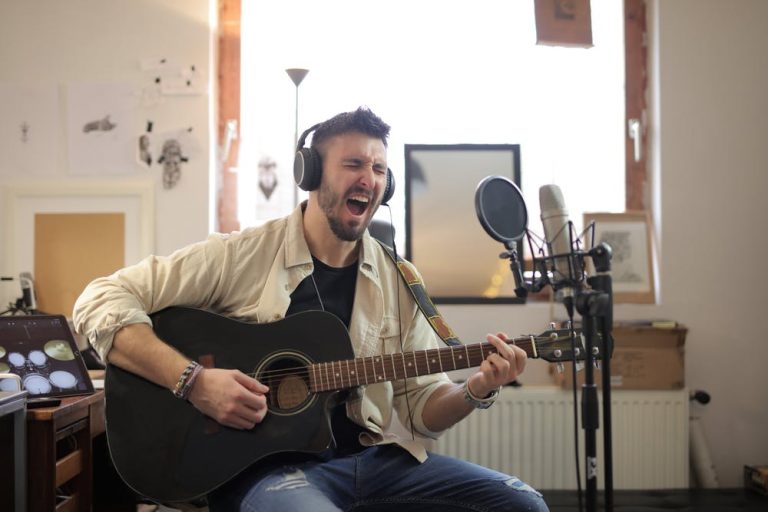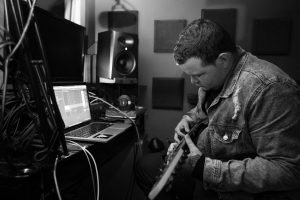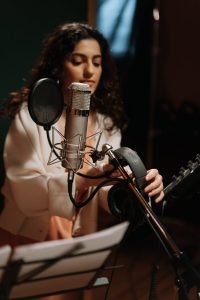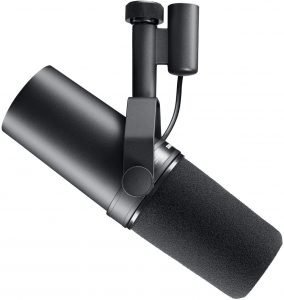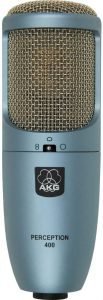In this article, I am going to be talking about the best microphones for guitar and vocals.
There are many different types of microphones out there, and in this article, I am going to talk about some of the more popular types that people use.
But first let’s compare dynamic v/s condenser microphones for playing guitar & recording vocals.
You want to balance the microphone with your amp so it doesn’t distort your sound when amplification is on.
The level settings can also vary greatly between different microphones and even between different artists’ performances and styles.
Most guitarists end up using dynamic microphones for recording.
There are some advantages to using a condenser microphone, however, it seems to be favored for live performances.
I believe this is because of the way that the sound bounces from the stage and interacts with the microphone.
So, as you can see there are multiple options when it comes to a microphone for your guitar.
Table of Contents
How to Choose a Microphone For Guitar and Vocals
Sensitivity
Microphone sensitivity is the amount of sound pressure that the microphone can handle at a given distance in front of it. The greater the microphone sensitivity, the less your amplifier will need to be turned up for a good sound level.
Pre-Amp
A pre-amp will amplify and condition your input signal before it passes into your mixer or recorder, so having a versatile one with an adjustable gain setting can really come in handy. A compressor has two controls: one sets how much compression is applied to all signals passing through; the other sets how much difference there is between loud and soft sounds. This lets you get more even levels without turning up or down individual tracks.
Noise Reduction
A noise reduction system reduces unwanted sounds such as hissing, wind or low-level hums. A noise gate creates a short gap in an audio signal when the noise reaches a certain level — this means that you can remove a gale of wind from the beginning of a guitar solo for instance, without affecting the rest of the signal.
XLR Connectivity
If you’re using XLR cables with your microphones, it’s important to make sure they are wired correctly. The diagram below shows the pin layout for an XLR output on gear such as a mixer or pre-amp — this information can be found in your owner’s manual.
Here is the order in which XLR cables are wired:
Guitar cables are also wired in a particular way. There is no standard for the way instrument cables are wired, so always make sure that your guitar cable is wired correctly for your equipment.
Here’s a guide to the standard wiring scheme for guitar cables:
There are two main types of guitar cables available, shielded and unshielded. Shielded guitar cables offer extra protection from electrical interference. All the wiring in a shielded cable is surrounded by a copper shield, which prevents unwanted interference from entering the cable. Unshielded guitar cables are lighter and cheaper, but they are not as effective at blocking out external interference.
8 Best Microphones For Guitar and Vocals
1. Shure SM58
This model is best for heavy and hard music genres such as punk, metal, and hardcore. It offers a high coilability which means it can work well in a wide range of settings.
2. AKG C414B-ULS
This model is best for those who are looking for a microphone that will produce the warmest sound out of all three models mentioned on this list. The AKG makes use of an audio transformer which allows you to work with low impedance sources without worrying about noise interference or signal loss as a result.
3. Blue EngiNeer
This is the most affordable option on this list due to its overall performance being significantly lower
4. Shure SM81
This microphone is best for use with condenser microphones. It’s capable of handling the heavy duty job of recording a wide range of sounds which includes bass, metal, and vocals. The uncoiled model has better sound quality than the woven cable models.
5. Behringer Ultra USB Microphone
This is a lightweight digital recording mic that can be used effectively for live music performances or Vlogging/YouTube videos.
6. Shure SM7B
This is the top of the line model on this list. It’s considered a dynamic microphone which is best for live studio performances and vocals. The Shure mic has a low sensitivity or impedance that makes it an effective choice for use with most instruments.
7. Shure SM58S
This model comes with a switchable pattern design which can be configured to provide cardioid and omni polar patterns which are effective in picking up different noises from all directions as well as directly above and below it.
8. AKG Perception 400
This mic is best for those who are looking for a mic that will perform well without the need to spend a lot of money. It’s an excellent choice for beginning musicians and singers. The AKG is affordable while still having the power to produce a high quality sound quality.
Dynamic vs Condenser Microphones for Recording
Dynamic Microphones
First off, we will start off with the dynamic microphone.
This microphone utilizes a strong magnet, diaphragm and a coil of wire.
The diaphragm is what vibrates when sound waves hit it, and the coil of wire is attached to an amplifier.
The main advantage to using a dynamic microphone over other types of microphones is that they can produce excellent quality without an external power source.
If you are just starting out and don’t know much about microphones at all, I would recommend a dynamic microphone as one of your first purchases.
Most people prefer to start off at this stage rather than go down the road and end up spending more money on expensive microphones.
If you want to get started with a dynamic microphone, I would recommend starting off with the Audio-Technica AT2020.
This is an excellent choice for an entry-level dynamic microphone.
Condenser Microphones
After you have used your dynamic microphone for a bit and want to move up to something better, then I would suggest moving on to a condenser microphone.
The condenser microphone is probably the most popular type of microphone out there, and also one of the more expensive types of microphones.
This is why I am recommending that you start off with a dynamic microphone before moving on to this one.
The condenser microphone works similarly to a dynamic microphone, but it does require an external power source. This is because it uses a magnet, diaphragm, and amplifier.
Although the Condenser microphone requires an external power source , it also has some advantages over the dynamic microphone. The main advantage is that the condenser microphone can be adjusted to give you more or less volume with a few clicks.
If you want to get started with one of these microphones, I would recommend getting the Shure SM57 along with it. However, I would recommend getting either the Shure SM58 or the Heil PR-33 microphone if you want it to work with a guitar.
FAQs
How do you record guitar and vocals at the same time?
The following are some of the different ways you can record both at the same time:
Connect your microphone to a mixer, and then plug the other line out from the mixer into the guitar amps input. This will allow you to hear yourself while recording vocals.
Connect your microphone directly to one channel on a two-channel interface with inputs for guitar amplification and vocals, set up each instrument in its own track within your DAW, and pan them so that they’re on opposite sides of an imaginary center line. This way both audio sources will be mixed down together but will still maintain separate tracks.
Plug headphones into one channel of a two-channel interface with inputs for guitar amplification and vocals, play your guitar through one amp, and record vocals on the other.
Connect both your microphone and instrument directly to a direct box, and then plug the direct box into your mixer. This will allow you to connect everything up with its own individual volume controls.
Which microphone is best for guitar?
A cardioid condenser microphone is best for recording electric guitar like the AKG C414 stereo or AKG D12VR. You can also get away with a dynamic microphone like a Shure SM57 or Sennheiser MD421.
Which MIC is best for vocal recording?
Although not as commonly used as a condenser or dynamic microphones, ribbon microphones are extremely popular with many well-known artists. The RCA 77DX is a good one.
Can you use a vocal mic to record guitar?
Yes, you can. You can also use a condenser microphone for electric guitar since it has a tighter pickup pattern than dynamic microphones. Which is better, condenser or dynamic microphones?
Condenser mics are said to be superior for recording vocals and instruments due to their high output, thin diaphragm, and other factors that make them very sensitive; but some people still prefer dynamic mics because of their lower sensitivities. I’d suggest using the mic that gives you the best tone. You can always mic a guitar amp if you like a particular sound out of your guitar amp.
FAQ:
Q: What is the best mic to record vocals?
A: Sontronics Solo microphone. The Solo is a well-weighted,solid microphone; light hand-held mics suck. … IK Multimedia iRig Mic Studio. Not every budget can stretch to pro-level prices,yet the burst in popularity of streaming and podcasting has seen a surge in demand for … Rode NT1 microphone. … Audio Technica AE2300 microphone. … Shure MV7. …
Q: How to choose the best vocal microphone?
A: Dynamic. Read up on how to read microphone polar patterns. The first kind of microphone is a dynamic microphone. Condenser. The other type of popular microphone type is a condenser. This works slightly differently and uses capacitor plates instead of a coil and magnets. Ribbon microphones. Less common types of microphones include ribbon mics. …
Q: What kind of microphone is best for recording vocals?
A: Shure SM57. Shure is a popular company offering many affordable microphones. Behringer XM8500. The ultimate budget option,the XM8500 is excellent for live performance. Sennheiser e835. … Audix i5. … AKG D5. … Rode NTK. … MXL 770. … Neumann TLM-102. … Audio-Technica AT2035. … AKG C214. …
Q: What is the best vocal stage microphone?
A: Audio-Technica AT2020. Condenser microphones are considered to be the best choice for vocal recording. … Shure SM58. The SM58 is a classic microphone that you would have seen on stages all over the world. … Behringer SL 84C. It’s impossible to talk about cheap microphones without mentioning Behringer. …
